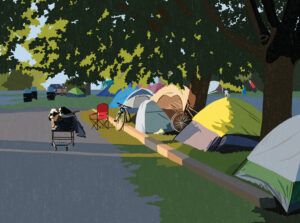
People & Culture
Kahkiihtwaam ee-pee-kiiweehtataahk: Bringing it back home again
The story of how a critically endangered Indigenous language can be saved
- 6310 words
- 26 minutes
People & Culture
The award-winning author recalls her past and recent adventures around the McGill University campus

The McGill campus always stood out to me, growing up in Montreal. It was so noticeable, the way it opened up through these big gates into what seemed to be this strange, Victorian world. I would think, “When I grow up, I’m going to study English literature there.” When I became a student at McGill, the campus was a sort of bubble in the city that was so magical. I love that as soon as you get there, there’s this river of young people and conversation and laughter. I remember being a student and thinking, “I want to be an old lady and still come here with my books and be surrounded by young people.” I always had this dream that McGill would bequeath me one of the large old houses on campus, so I could just live there and read. I mostly grew up in tiny little apartments, so the houses there are so marvellous to me.
I recently met up with an old friend from McGill. Both of us had come from working-class backgrounds, and we reminisced about how the university was a place where we were able to escape this poverty and to mix with middle-and upper-class kids. I loved just sitting on the steps of the Arts Building with all these other students who were so fascinated by literature. I felt like I had finally met my people. Every time I go back, I feel like I’m entering this strange little kingdom again, where people read books and talk about them and are somehow able to escape the problems of actual life.
– as told to James Ivison
McGill University (Tiohtiá:ke/Montreal) is located on the traditional territory of the Kanien’kehà:ka (Mohawk), a place which has long served as a site of meeting and exchange amongst many First Nations, including the Kanien’kehá:ka of the Haudenosaunee Confederacy, Huron-Wendat, AbenakiandAnishinaabeg.
Are you passionate about Canadian geography?
You can support Canadian Geographic in 3 ways:

This story is from the November/December 2022 Issue

People & Culture
The story of how a critically endangered Indigenous language can be saved

Places
In Banff National Park, Alberta, as in protected areas across the country, managers find it difficult to balance the desire of people to experience wilderness with an imperative to conserve it

Science & Tech
The Canadian High Arctic Research Station is set to open in Cambridge Bay, Nunavut, later this year. How will it affect our understanding and appreciation of the North and the rapid change occurring there?

People & Culture
For unhoused residents and those who help them, the pandemic was another wave in a rising tide of challenges